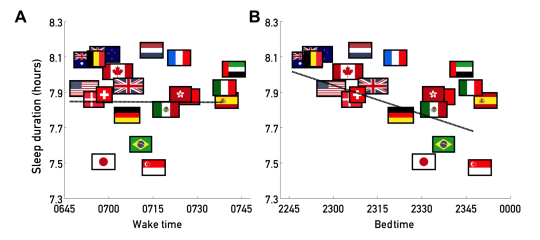Question Your World: How Are Humans Sleeping All Over the World?
Did everyone have a good night’s sleep? We all know that sleep is super important for basic physical and mental functions, but are humans getting enough sleep everywhere? To take on a survey that hits populations from all over the planet would take an enormous amount of work, but thanks to app technology that job has been made a little easier. Check out what happened when scientists used an app to answer the big question: How do we sleep around the world?
A recent study was just published documenting the sleeping trends across the globe, thanks to an app. Scientists created an app to help people combat jet lag. Thousands of people around the globe used this app which generated some pretty remarkable data. To use the app, users had to input their usual sleep times and amount of time spend in sunlight. After compiling a globe’s worth of data, scientists started to see some very interesting trends.
It looks like sunlight is still waking up most of the planet just fine. Our body is designed to respond to sunlight as the start of our daily cycle. In the back of our eyes we have this little cluster of 20,000-some neurons that regulate our 24-hour circadian rhythm. This more or less remained the waking force in most people’s lives, but the sleeping aspect seems to be vastly changed due to societal pressures. Parties, bars, late concerts, and other nighttime activities seem to be making a noticeable impact on when we go to sleep all over the planet. So much so that it is impacting nearly 30% of the population!
This study also broke down some pretty detailed metrics as well. For example they found that middle aged men sleep the least out of everyone on the planet. Women tend to schedule more sleep than men do. Places like Japan and Singapore are getting significantly less sleep than places like The Netherlands or Australia. The United States falls basically in the middle of the range. As a species we should be hitting somewhere between 7 and 8 hours a night, but this survey showed that in many cases a lot of people are getting less than the total amount of sleep needed to be functional.

Image provided by University of Michigan
Missing just a little sleep for long periods of time can be problematic as well. For example, if people get irregular sleep for a few weeks, their perception of their own goings-on changes. Meaning one could be operating poorly in life but, due to a sleepy perspective, think he or she is doing a great job. The body is functionally drunk at this point. Proper sleep is vital for healthy mental functions. Something that the globe may want to pay more attention to, according to this study.
Regardless this study is being called a huge victory for mobile apps and their potential future as an affordable global research tool. Now we need to figure out how to get funding to do app-related research like Tinder. What a time to be alive!